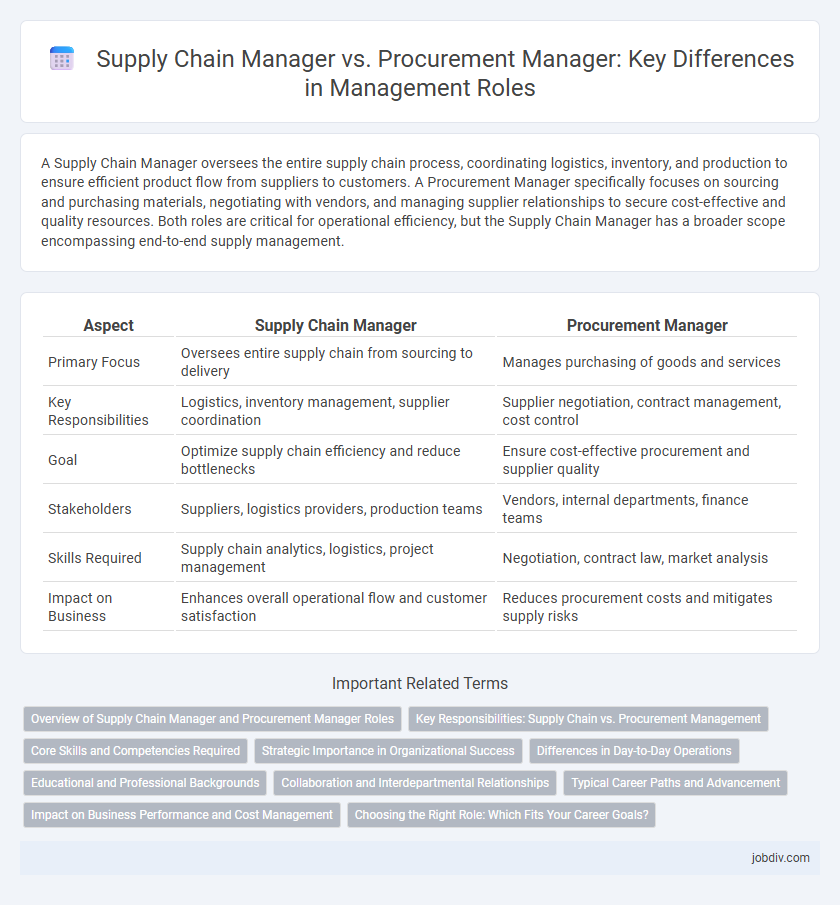A Supply Chain Manager oversees the entire supply chain process, coordinating logistics, inventory, and production to ensure efficient product flow from suppliers to customers. A Procurement Manager specifically focuses on sourcing and purchasing materials, negotiating with vendors, and managing supplier relationships to secure cost-effective and quality resources. Both roles are critical for operational efficiency, but the Supply Chain Manager has a broader scope encompassing end-to-end supply management.
Table of Comparison
| Aspect | Supply Chain Manager | Procurement Manager |
|---|---|---|
| Primary Focus | Oversees entire supply chain from sourcing to delivery | Manages purchasing of goods and services |
| Key Responsibilities | Logistics, inventory management, supplier coordination | Supplier negotiation, contract management, cost control |
| Goal | Optimize supply chain efficiency and reduce bottlenecks | Ensure cost-effective procurement and supplier quality |
| Stakeholders | Suppliers, logistics providers, production teams | Vendors, internal departments, finance teams |
| Skills Required | Supply chain analytics, logistics, project management | Negotiation, contract law, market analysis |
| Impact on Business | Enhances overall operational flow and customer satisfaction | Reduces procurement costs and mitigates supply risks |
Overview of Supply Chain Manager and Procurement Manager Roles
Supply Chain Managers oversee the end-to-end flow of goods, information, and finances from raw material sourcing to product delivery, ensuring operational efficiency and cost-effectiveness. Procurement Managers specialize in acquiring goods and services, negotiating contracts, and managing supplier relationships to meet organizational needs. Both roles are critical in optimizing supply chain performance but differ in scope, with Supply Chain Managers focusing on overall logistics and Procurement Managers concentrating on strategic purchasing.
Key Responsibilities: Supply Chain vs. Procurement Management
A Supply Chain Manager oversees the end-to-end flow of goods, information, and finances, focusing on logistics, inventory control, demand forecasting, and supplier relationship management to ensure timely delivery and cost efficiency. In contrast, a Procurement Manager specializes in sourcing and purchasing raw materials or services, negotiating contracts, managing vendor performance, and ensuring compliance with procurement policies. While supply chain management emphasizes operational coordination and overall supply flow, procurement centers on strategic supplier selection and acquisition processes.
Core Skills and Competencies Required
Supply Chain Managers require expertise in logistics optimization, inventory control, and demand forecasting to ensure efficient end-to-end product flow. Procurement Managers must possess strong negotiation skills, supplier relationship management, and contract administration to secure cost-effective and quality materials. Both roles benefit from analytical thinking, strategic planning, and proficiency in enterprise resource planning (ERP) systems to drive operational excellence.
Strategic Importance in Organizational Success
Supply Chain Managers optimize end-to-end processes, integrating logistics, inventory, and supplier relationships to enhance operational efficiency and reduce costs, directly impacting organizational profitability. Procurement Managers focus on strategic sourcing, supplier negotiations, and contract management to secure quality materials at competitive prices, ensuring uninterrupted production and innovation. Both roles are critical for organizational success, with Supply Chain Managers driving holistic efficiency and Procurement Managers safeguarding supply stability and cost-effectiveness.
Differences in Day-to-Day Operations
Supply Chain Managers oversee the entire production flow, coordinating logistics, inventory, and distribution to ensure timely delivery of goods, while Procurement Managers specialize in sourcing and purchasing materials, negotiating contracts, and managing supplier relationships. Supply Chain Managers focus on optimizing the end-to-end supply process, monitoring demand forecasts, and handling warehousing operations. Procurement Managers handle vendor evaluations, cost analysis, and order placements, ensuring compliance with budget and quality standards.
Educational and Professional Backgrounds
A Supply Chain Manager typically holds a degree in supply chain management, logistics, or industrial engineering, with extensive experience in operations, inventory control, and distribution planning. Procurement Managers often possess educational backgrounds in business administration, finance, or commerce, complemented by professional expertise in vendor management, contract negotiation, and sourcing strategies. Certifications such as CSCP (Certified Supply Chain Professional) for Supply Chain Managers and CPP (Certified Procurement Professional) for Procurement Managers enhance credibility and career advancement in their respective fields.
Collaboration and Interdepartmental Relationships
Supply Chain Managers and Procurement Managers collaborate closely to ensure seamless operations from sourcing to delivery, optimizing inventory levels and supplier performance. Their interdepartmental relationships involve coordinating with logistics, production, and finance teams to align procurement decisions with supply chain strategies. Effective communication and data sharing between these roles enhance responsiveness to market changes and reduce operational risks.
Typical Career Paths and Advancement
Supply Chain Managers typically advance by gaining expertise in logistics, operations, and inventory management, often moving into roles such as Director of Supply Chain or VP of Operations. Procurement Managers usually progress through roles centered on vendor management, contract negotiation, and strategic sourcing, leading to positions like Procurement Director or Chief Procurement Officer. Both career paths benefit from developing leadership skills and cross-functional experience to reach executive levels within an organization's supply chain and procurement functions.
Impact on Business Performance and Cost Management
Supply Chain Managers optimize the end-to-end flow of goods, enhancing operational efficiency and reducing lead times, which directly improves business performance through better inventory control and customer satisfaction. Procurement Managers concentrate on sourcing strategies and vendor negotiations to lower purchasing costs and ensure quality materials, significantly impacting cost management and profit margins. Both roles collaborate to align supply chain activities with financial goals, driving sustainable growth and competitive advantage.
Choosing the Right Role: Which Fits Your Career Goals?
A Supply Chain Manager oversees the end-to-end logistics, inventory, and delivery processes to ensure efficient production flow, while a Procurement Manager focuses on sourcing, negotiating, and purchasing goods and services to optimize costs and supplier relationships. Choosing the right role depends on your career goals: if you aim to influence operational efficiency and supply chain strategy, supply chain management suits you; if you prefer strategic vendor management and cost control, procurement is ideal. Both roles require strong analytical, negotiation, and leadership skills but cater to different aspects of business operations and career specialization.
Supply Chain Manager vs Procurement Manager Infographic

 jobdiv.com
jobdiv.com